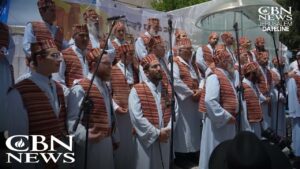Settled in Seattle
 Filipino couple fills a need with Hope of the City Church.
Filipino couple fills a need with Hope of the City Church.
Five years ago, Dave E. Cole, Northwest Ministry Network assistant superintendent, traveled to the Philippines with Filipino natives Luis E. Solero and his wife, Ruth. The founding pastors of Hope of the City Church (HOTCC) in suburban Seattle took Cole onto a vacant piece of property. The group had to nearly fight off a water buffalo before they reached what became the latest HOTCC mission.
“We’re going to plant a church here someday,” Luis told the ministry network leader. Today, that land marks HOTCC’s seventh campus in the Philippines.
“I’m amazed at the miracles and resources that flow in their work,” says Cole, 65. “When they say they’re going to plant a church, it happens. God has definitely given them favor.”
It didn’t look that way when the Soleros arrived in the United States in 2001. They joined the staff at an AG church in Hawaii, but a year later the senior pastor died. Although another pastor asked Luis to become his associate pastor, the couple felt God calling them to plant a church in one of the most unchurched cities in America.
“When we got to Seattle, we didn’t know anyone,” recalls Luis, 49. “We didn’t have any relatives here, and only had $200 left in our pockets.”
Through a pastoral connection, they found a temporary home in a congregant’s basement. Then they started calling a list of Filipino names they had been given, only to learn the church most had attended had disbanded.
By the end of the year, the discouraged couple almost gave up and moved back to the Philippines. But Ruth, 51, found secretarial work while Luis became a teller at a Filipino money remittance company.
“We started to get to know Filipinos by crashing parties at different houses,” Luis says. “People would ask who we were and we’d say, ‘We’re church planters.’ People would ask, ‘Where’s your church?’ and we’d say, ‘One day we will have one.’”
They started with several small home groups before formally launching Hope of the City in 2005. The congregation had a nomadic existence its first 10 years, repeatedly shifting to such locations as a shopping mall, movie theater, hotel, warehouse, and community center.
Although they settled in SeaTac, less than a mile from the Seattle Tacoma International Airport, government-ordered pandemic-related lockdowns in 2020 forced HOTCC to shift to house churches.
The Soleros had prepared for the challenge, having trained more than 50 HOTCC School of Ministry students for the task. Today, these home groups still meet on various days during the week.
“During COVID-19 we never stopped having worship,” says Luis, who now serves as a Northwest Ministry Network executive presbyter. “We have a strong worship and volunteer team and had a team to do a livestream. In the afternoon all the house churches met to discuss what we taught Sunday morning and have fellowship and prayer.”
While average attendance of 300 is 25% lower than pre-pandemic levels, HOTCC still needs three Sunday services to accommodate everyone. The congregation is about 90% Filipino.
In addition to the churches they have planted in their native land, the Soleros plan to launch a Filipino congregation this summer in Anchorage, Alaska, through the Church Multiplication Network.
The project got its start after the Soleros participated in a panel discussion at last August’s General Council in Orlando, Florida. Afterward, Alaska Ministry Network Superintendent Bill Welch told them 30,000 Filipinos lived in Anchorage alone, but had no ethnic AG church.
That prompted the Soleros to form a team to make monthly visits to Anchorage and eventually host meetings in a hotel. After Anchorage, they envision starting another mission in Kapolei, about 20 miles west of Honolulu.
Such outward-focused efforts are an inspiration to other congregations in the Northwest Ministry Network, according to Cole.
“Church planting is one of the best and fastest ways to multiply the Kingdom,” Cole says.
“We’re going to plant a church here someday,” Luis told the ministry network leader. Today, that land marks HOTCC’s seventh campus in the Philippines.
“I’m amazed at the miracles and resources that flow in their work,” says Cole, 65. “When they say they’re going to plant a church, it happens. God has definitely given them favor.”
It didn’t look that way when the Soleros arrived in the United States in 2001. They joined the staff at an AG church in Hawaii, but a year later the senior pastor died. Although another pastor asked Luis to become his associate pastor, the couple felt God calling them to plant a church in one of the most unchurched cities in America.
“When we got to Seattle, we didn’t know anyone,” recalls Luis, 49. “We didn’t have any relatives here, and only had $200 left in our pockets.”
Through a pastoral connection, they found a temporary home in a congregant’s basement. Then they started calling a list of Filipino names they had been given, only to learn the church most had attended had disbanded.
By the end of the year, the discouraged couple almost gave up and moved back to the Philippines. But Ruth, 51, found secretarial work while Luis became a teller at a Filipino money remittance company.
“We started to get to know Filipinos by crashing parties at different houses,” Luis says. “People would ask who we were and we’d say, ‘We’re church planters.’ People would ask, ‘Where’s your church?’ and we’d say, ‘One day we will have one.’”
They started with several small home groups before formally launching Hope of the City in 2005. The congregation had a nomadic existence its first 10 years, repeatedly shifting to such locations as a shopping mall, movie theater, hotel, warehouse, and community center.
Although they settled in SeaTac, less than a mile from the Seattle Tacoma International Airport, government-ordered pandemic-related lockdowns in 2020 forced HOTCC to shift to house churches.
The Soleros had prepared for the challenge, having trained more than 50 HOTCC School of Ministry students for the task. Today, these home groups still meet on various days during the week.
“During COVID-19 we never stopped having worship,” says Luis, who now serves as a Northwest Ministry Network executive presbyter. “We have a strong worship and volunteer team and had a team to do a livestream. In the afternoon all the house churches met to discuss what we taught Sunday morning and have fellowship and prayer.”
While average attendance of 300 is 25% lower than pre-pandemic levels, HOTCC still needs three Sunday services to accommodate everyone. The congregation is about 90% Filipino.
In addition to the churches they have planted in their native land, the Soleros plan to launch a Filipino congregation this summer in Anchorage, Alaska, through the Church Multiplication Network.
The project got its start after the Soleros participated in a panel discussion at last August’s General Council in Orlando, Florida. Afterward, Alaska Ministry Network Superintendent Bill Welch told them 30,000 Filipinos lived in Anchorage alone, but had no ethnic AG church.
That prompted the Soleros to form a team to make monthly visits to Anchorage and eventually host meetings in a hotel. After Anchorage, they envision starting another mission in Kapolei, about 20 miles west of Honolulu.
Such outward-focused efforts are an inspiration to other congregations in the Northwest Ministry Network, according to Cole.
“Church planting is one of the best and fastest ways to multiply the Kingdom,” Cole says.




